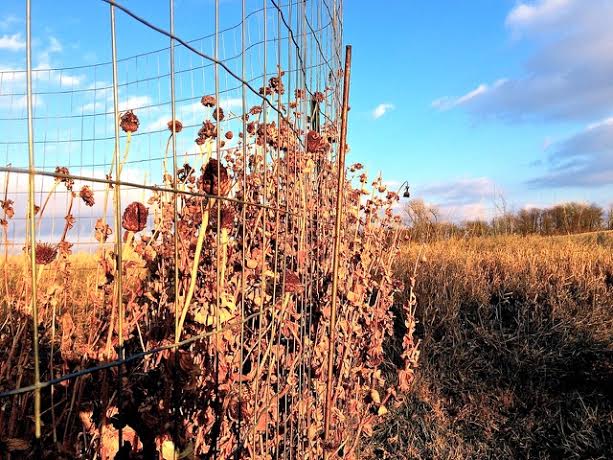Meditation can help us accept loss from the inevitable end of a bountiful garden to the unexpected end of a marriage.
The beginning of winter is a double-edged sword: we are blessed with crisp days and crystal blue skies which come hand-in-hand with cold weather, shorter, darker days, and something that always takes me by surprise—the first frost.
Every spring I plant a garden, later plucking juicy ripe tomatoes straight from the vine, harvesting gorgeous greens and digging potatoes. Then, like some cruel cosmic joke, I’m forced to watch it all die. The tomatoes are the first to go—the vines shrivel up and turn brown, while a few desperate green globes cling to hope. The veggies that enjoy cool temperatures tease me and come back to life. My Swiss chard, for example, was as lovely in November as it was in May. But the end is always near. Just like that, one night it dips below 32 ° F and ZAP! No more ‘maters, no more leafy greens.
Gone…everything reduced to a pile of compost.
Normally, my gardening partner and I are at our plot covering our plants at the first forecast of frost. We put them to bed like babies, tucking them in to stay nice and warm… and alive. I keep sheets and blankets just for the occasion. We go to great lengths to stretch out the season and we are usually able to buy some time, so it’s worth the effort. Or is it?
This year I decided to let it go. I allowed Mother Nature to do her brutal thing. The weatherman (truthfully, my iPhone) called for a freeze. I cringed at the news, then donned my gardening gear and with my dog Oscar, went to pay my final respects. Oscar guarded for garlic-stealing squirrels while I harvested a handful of courageous cherry tomatoes, cut some stunning celery, and snipped a bouquet of chard. I even found an onion or two cleverly hiding amongst the marigolds.
Was I sad? Absolutely. But we cannot mess with Mother Nature.
Why was this year different? What allowed me to embrace the death of my coveted collards? I think I know.
This has been a tough year for me. Going through what I can now refer to as a “conscious uncoupling,” (thanks to Gwyneth Paltrow for this trendy euphemism for d-i-v-o-r-c-e) I often took refuge on my meditation cushion and I’m certain that this time alone in the wee hours of the morning helped me to find acceptance, acceptance of the little things, like the end of summer and my vegetable garden, to the staggering loss of a 16-year marriage.
When we learn to graciously accept the things we cannot change, we are happier and life ceases to be such a struggle. The loss of a job, the diagnosis of an illness, the death of a marriage, these all are heartbreaks that cause us pain and sorrow. But what in the world can we do to change them?
By sitting in silence, with nothing but oneself and one’s thoughts, the practice of meditation disciplines the mind. It trains us to be quiet and still when it’s the last thing we want to do. Meditation teaches us that no matter how numb our leg is from being folded up like a pretzel, it probably won’t fall off. When we train the mind, we are better prepared to accept the unpleasant and painful situations that life has in store. By learning to observe our thoughts and emotions we learn not to react.
By learning to hit the “pause” button before hitting “send,” life becomes easier, more pleasant and less of a struggle.
Minutes logged on my meditation cushion have taught me that heartbreaking loss and frightening uncertainty too shall pass—and, that nothing lasts forever. There will be happier days and more sad ones as well. That’s just the way it goes.
So, we accept it, just like we must accept that the vegetables in our garden will not survive the frost.
Love elephant and want to go steady?
Sign up for our (curated) daily and weekly newsletters!
Author: Lisa Murphy
Editor: Renée Picard
Photo: courtesy of the author












Read 3 comments and reply